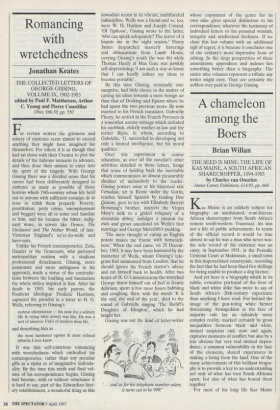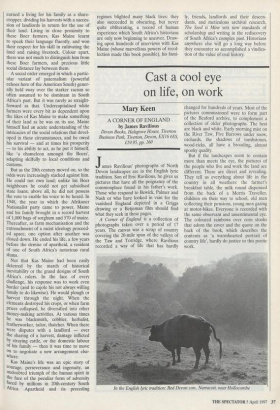A chameleon among the Boers
Brian Willan
THE SEED IS MINE: THE LIFE OF KAS MAINE, A SOUTH AFRICAN SHARECROPPER, 1894-1985 by Charles van Onselen James Currey Publishers, £14.95, pp. 660 Kas Maine is an unlikely subject for biography: an uneducated, semi-literate African sharecropper from South Africa's remote south-western Transvaal, his was not a life of public achievement. In terms of the official record it would be true almost to say he was a man who never was: the sole record of his existence was an entry, in September 1931, in the Periodic Criminal Court at Makwassie, a small town in this impoverished countryside, recording the fact that he had been fined five shillings for being unable to produce a dog licence.
And yet here is a biography which in its subtle, evocative portrayal of the lives of black and white alike has more to say of South Africa's 20th-century experience than anything I have read. For behind the image of the gun-toting white farmer threatening Armageddon in the face of majority rule lay an infinitely more complex reality, marked certainly by gross inequalities between black and white, mutual suspicion and, now and again, explosive moments of conflict, but also by a less obvious but very real mutual depen- dence, a common vulnerability in the face of the elements, shared experiences in making a living from the land. One of the many achievements of this brilliant biogra- phy is to provide a key to an understanding not only of what has torn South Africans apart, but also of what has bound them together.
For most of his long life Kas Maine earned a living for his family as a share- cropper, dividing his harvests with a succes- sion of landlords in return for the use of their land. Living in close proximity to these Boer farmers, Kas Maine learnt to speak their language fluently, and won their respect for his skill in cultivating the land and raising livestock. Colour apart, there was not much to distinguish him from these Boer farmers, and precious little social distance lay between them.
A social order emerged in which a partic- ular variant of paternalism (powerful echoes here of the American South) gener- ally held sway over the starker racism so often assumed to be dominant in South Africa's past. But it was rarely as straight- forward as that. Undercapitalised white farmers were every bit as dependent upon the likes of Kas Maine to make something of their land as he was on its use. Maine himself had an acute understanding of the intricacies of the social relations that devel- oped in these circumstances, and he owed his survival — and at times his prosperity — to his ability to act, as he put it himself, like 'a chameleon amongst the Boers', adapting skilfully to local conditions and customs.
But as the 20th century moved on, so the odds were increasingly stacked against him. He could not own land; unlike his Boer neighbours he could not get subsidised state loans; above all, he did not possess the vote to enable his voice to be heard. In 1948, the year in which the Afrikaner Nationalist party came to power, Maine and his family brought in a record harvest of 1,000 bags of sorghum and 570 of maize. Thereafter, as farm mechanisation and the entrenchment of a racist ideology proceed- ed apace, one option after another was closed down. He ended his life, a few years before the demise of apartheid, a resident of one of South Africa's notorious rural slums.
Not that Kas Maine had been easily deterred by the march of historical inevitability or the grand designs of South Africa's rulers. In the face of every challenge, his response was to work even harder (and to cajole his not always willing family to do likewise). He would plough or harvest through the night. When the elements destroyed his crops, or when farm prices collapsed, he diversified into other money-making activities. At various times he was blacksmith, cobbler, herbalist, leatherworker, tailor, thatcher. When there were disputes with a landlord — over the sharing of a harvest, damage inflicted by straying cattle, or the domestic labour of his family — then it was time to move on to negotiate a new arrangement else- where.
Kas Maine's life was an epic story of courage, perseverance and ingenuity, an undoubted triumph of the human spirit in the face of the peculiar form of adversity faced by millions in 20th-century South Africa. Apartheid and its preceding regimes blighted many black lives: they also succeeded in obscuring, but never quite obliterating, a record of human experience which South Africa's historians are only now beginning to uncover. Draw- ing upon hundreds of interviews with Kas Maine (whose marvellous powers of recol- lection made this book possible), his fami- ly, friends, landlords and their descen- dants, and meticulous archival research, The Seed is Mine sets new standards of scholarship and writing in the rediscovery of South Africa's complex past. Historians anywhere else will go a long way before they encounter so accomplished a vindica- tion of the value of oral history.



























































 Previous page
Previous page